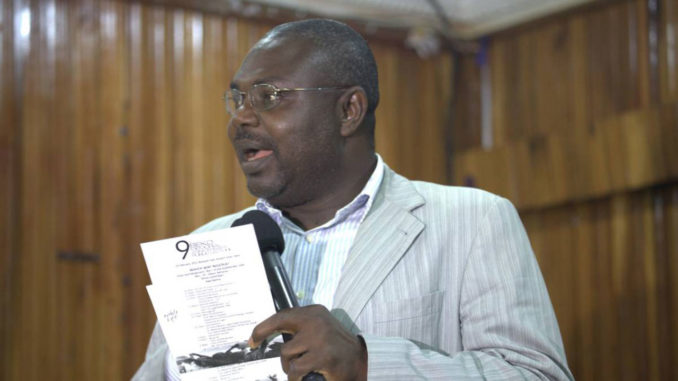
In the course of the 2015 general elections, I travelled through the peril of bad roads to Ekpoma to cast my vote in the presidential election. Truly, I voted for Buhari. Despite the irregularities of the process, he won though with an implicit Carter clause, which is that though there were obvious irregularities, they were not enough to warrant an annulment. Many of us who were impatient with President Jonathan and the contradictions of his administration felt change was indeed required. One singular reason that made me vote for Buhari was the thinking that he would be anti-imperialist and exercise national autonomy in key policies.
Today, it has turned out that I made a mistake. I apologise. The very reason for voting for him was the first casualty. For him to be president he had to be sold to the Americans who bought his candidacy and who subsequently asked him to open the economy for foreign investment, a euphemism for external control. Christine Lagarde, the Empress of IMF visited and gave the administration a cocktail of slave driving tools to further impoverish Nigerians struggling to eke out a bare living. Her recipes were subsidy removal, flexible currency, increased value added tax and stamp duty among others.
Truly, the state of the nation pre-2015 was saddening and Nigerians truly deserved a lease from the overwhelming national problems. Jonathan Administration inherited a paralysed state structure even though he was the vice president to President Yar’adua. The business of state took the backstage as a result of the illness of the president and its politicization. Jonathan did not understand the historical forces that shaped events in the country. He felt obligated to the cabal of retired military generals whom he credited with ushering in democracy.
Overwhelmed by the problem of governance, he ran his government through committees read as being a product of cluelessness than an act of inclusivity. He was unable to tame the oil cabal and oil subsidy became a national scandal warranting a major inquisition by the National Assembly. Petroleum products were short in supply and its prices were jerked up from N65 to N141 thereby deepening the misery of the people, notwithstanding the subsequent reversals. Boko Haram intensified their activities and much of the north-east was under sect’s occupation.
While his government was engaged with the insurgents and with mercenaries to boot, the war itself spawned an armament profiteers who reportedly bought second rate weapons for the soldiers in ways that the war became an Automated Teller Machine (ATM). Money ostensibly meant for purchase of arms was seized in far away South Africa. The president was seen by the impatient public as slow and weak. He did not help matters when he said he was not a general thereby eliciting the question of who he was— a Goliath or David? Nonetheless, his administration rebased the national economy upping the country to the status of the biggest economy in the continent.
Although, he privatised the Power Holding Company of Nigeria, he did not resolve the electricity problem and the country remained world importer of power generating set. Corruption was widespread with varied free riders dotting his administration. His government embarked on various infrastructure rehabilitation projects including airports and railway. To his credit, he fulfilled aspect of the electoral reform and brought credibility to the electoral umpire. He secured the lid on the Niger–Delta militants and ensured steady export of crude. He, however, squandered a historical opportunity of restructuring the country after organizing a National Conference in 2014 by neglecting to action aspects of the report to unbundle the over-centralised state. He did the unimaginable in a continent in which incumbents do not organise elections to lose (apologies to Pascal Lissouba of Congo Brazzaville). He handed over power to a successor and accepting the results of the presidential election before the final tally.
Under the watch of President Buhari, economic misfortune is continuing under the slavish economic policies of neoliberalism—those economic principles that privilege the market and its integral privatisation programme through divestment of the public sector. There are no economic laws that say that the private sector is superior to public sector. This is not borne by historical records. Its current version being pursued by the Nigerian government is Medium Term Economic Framework (MTEF). It is being implemented outside the rule book because the minders of the Nigerian state don’t understand it and naturally it can’t work in country that is badly divided without a common national creed.
It is least surprising that the policies therefrom are hardly being contested despite their deleterious effect on the national wellbeing. Indeed, they have become normalised. Besides, economic mismanagement has led to a rapidly increasing debt burden. The country is already thrown back to pre-2006 era of debt overhang with external debt hovering around $22 billion. As though nothing is amiss, the state actors are still comforting themselves with an elusive debt-to GDP ratio of 21 percent and a credit threshold of about 51 percent. They forgot that the country does not have a patriotic and discipline elite that can utilise credit facilities for the purpose they are meant for. The naira, its currency, weighted against that of many developing countries is worthless.
Add up. The consequence of a disarticulated economy is the acceleration of social vices, namely, kidnapping, ritually killings, 419, armed robbery, killings by security forces, bribe–taking, misappropriation of resources, subsidy scam, vending of fake products, prostitution and illegal migration across the Sahara desert to Libya enroute to Europe. These combined with structural violence such as the hike in prices of petroleum products, multiple taxes and attacks on the rule of law have aggravated the misery of the Nigerian people.
To be continued tomorrow .
• Akhaine, an Associate professor, Lagos State University is a visiting member, The Guardian Editorial Board
END

Be the first to comment